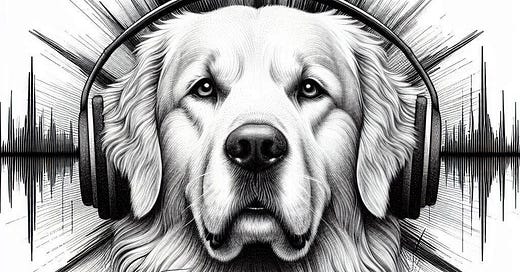Sounds Good! #38: Playlist for Life, Soaak, USC, Auracast, Wallifornia, MMM Duet System, The Power Of Music Consortium, Pet Acoustics
Tracking developments at the intersection of music, health and techology
Hello!
Welcome to issue #38 of Sounds Good! — your regular roundup of happenings at the intersection of music, health and technology.
A huge “thank you” to everyone who shared and gave feedback on the first ‘Music Healthtech’ market map last month. Lots of great input to factor in for ‘version 2’ which will be released after the summer.
For now though, here are this month’s updates:
Playlist for Life is celebrating National Playlist Day in the UK on 20th September 2024. The event was started in 2022, and helps promote the use of music to improve the lives of the 900,000 people in the UK living with dementia. Playlist for Life is interested in connecting with any potential partners looking to support National Playlist Day, and is contactable via info@playlistforlife.org.uk.
Audio wellness app Soaak is profiled and reviewed in TechRadar. Unlike other apps which take a more music-first approach, Soaak is focused on ‘collections of repeated frequencies’. Some of these can even be used in conjunction with other audio services: “It’s also possible to play them at the same time as your favorite music tracks on Spotify or Deezer if you’re not particularly keen on their music library.”
The University of Southern California held its first Music, Health and Policy workshop in June, organised by Assal Habibi, an associate professor at the Brain and Creativity Institute at USC. Renee Fleming was among the speakers, and noted, “The field has grown exponentially in the last 7 years. New research and technology are proving the benefits of arts… This once siloed field is coming together.” The workshop centred around topics including Childhood Development, Aging and Community Wellness. The full day was live streamed, and the recording is now available here.
Auracast is a new technology which enables multiple bluetooth devices to receive audio from a ‘broadcast’. The first hearing aids with this technology are now being released, and have the potential to improve people’s lives with better audio connectivity. For more information about how Auracast works for assistive listening, take a look at this explanation on the Auracast site.
MusicTech summit Wallifornia in Belgium ran a ‘Music & Health’ stream to their event last month which included panels on ‘Music, Technology and Health Convergence’ and ‘Innovations in Music Technology for Healthcare’. A startup competition formed part of the event, which was won by the UK music healthtech company MediMusic.
Researchers who developed the ‘Music Memory Makers (MMM) Duet System’ have published new research which found that “playing meaningful songs together is an enjoyable interactive activity that prompts musical reminiscence, involves joint agency, and supports relationship continuity within a relational, positive approach to dementia care”. Further details about the device used can be found here.
‘Music for pets’ might sound like a new product category, but it’s one in which Pet Acoustics has been developing products in for over 25 years. Together with PetPace, they published new research which shows that their auditory products reduce stress in pets more effectively than classical music or no music at all.
The Power of Music Consortium in the UK published a letter calling on politicians to commit to using music to improve health, wellbeing, and communities. The Consortium includes UK Music, Music for Dementia, Nordoff Robbins, National Academy for Social Prescribing, Manchester Camerata, and The Utley Foundation. The letter includes a calls for the incoming UK government to, “Partner with the music, health and third sectors to raise public awareness of the therapeutic power of music so they can incorporate it into healthy lifestyles”.
Researchers in Korea have published a meta-analysis of technology-based music interventions to reduce anxiety and pain undergoing surgery. The research reviewed 292 studies, and included 21 in the review - concluding that “a music intervention is a nonpharmacological complementary approach and shows a positive effect on patients, and up to 70% of studies reported a positive effect when patients were allowed to select the music themselves”.
“Even though we live in an age where technology allows us to easily be in touch...playing music together provides a more tangible type of connection”. This newsletter is very ‘pro’ technology , but also recognises that technology will never provide an adequate augmentation or substitution for some experiences. This piece about ‘Discovering The Mental Health Benefits Of Old-Time Music Jams’ is a testatment to that view.
I’ll be taking a month off this newsletter in August, look forward to reconnecting again in September.
Cheers!
Rob



